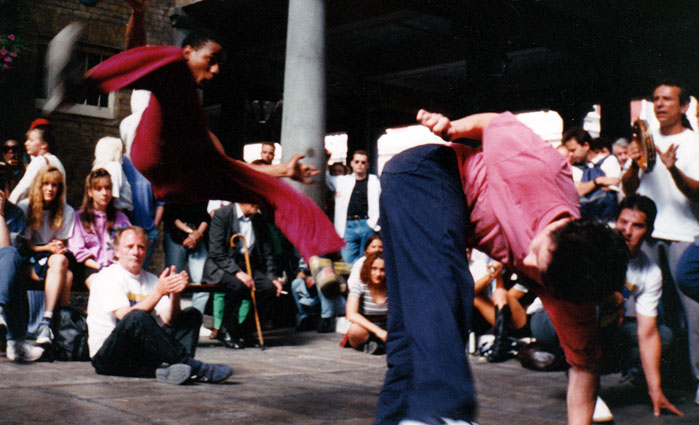Tim Gale
Tim has been following the East London Capoeira philosophy now for about 10 years. I (Master Fantasma) feel that Tim has passed many personal challenges to get to play capoeira the way he does today. I recognise this because i had similar difficulties. I have also noticed that the best teachers are often the ones that struggled most learning. Tim has amerced himself in capoeira and now supports the group as a performer, teacher and capoeira percussion player.
George Pintado
I started capoeira in 1996, when I was sixteen, with the pioneering capoeira teacher Simon Fantasma in Shoreditch, East London. I clearly remember my first lesson. The required coordination really challenging, and I felt completely unable to do anything. However, when I saw the capoeira being played at the end of the class I was captivated by the pulse of the music, grace of movement and the excitement of the fast kicks and acrobatics of the game. Slowly, through regular training I gained a bit of coordination and confidence to play capoeira myself.
Since then I have not stopped doing capoeira, I continued practising, and following numerous visits to Brazil to learn capoeira I find myself living and working in Rio de Janeiro.
In Rio I train capoeira with Marrom, who awarded me with the title of contramestre in 2009. Practising capoeira equipped me with a positive and playful outlook on life that I carry with me everywhere. It has enabled me to meet a diverse range of people, experience true friendship and camaraderie and become closer to the pulse of life itself.
Contribution
I directly contribute to the development of capoeira within Simon’s group through annual workshops when I am in London.
I provide a continous link between Simon’s teachings and Mestre Marrom’s here in Rio.
Henry Franklin
“I started learning capoeira with Mestre Marinheiro in 1995 when I lived for 6 months in his house in Baixa da Egua, Salvador, researching a dissertation on Song in the roda of capoeira for my university degree. Freddy Abreu helped me research my dissertation, with long hours of research at the Instito Maua. Marinheiro showed me my first steps, introducing me to life as a capoeira. He was always very open and encouraged me to improve my berimbau playing by taking lessons with Mestre Nenel, Bimba’s son. At the time Marinheiro was a young teacher with a vibrant group of children aged between 5 and 13. I was the oldest by far, but I learnt a lot in those early days, not least that size and age mean nothing in the roda of capoeira.
Once back in the UK, I continued to learn capoeira with Adam Barber (Macaco Barboiro) in Bristol, Mestre Joaozinho of Mar Azul and Simon Atkinson (Mestre Fantasma). My trajectory has been interrupted by work and family life but the urge to watch and play capoeira has been consistent throughout, and I am training again with Mestre Fantasma, hoping that my sons will one day trip me in the roda.
My early experience with Mestre Marinheiro gave me a concrete example of the empowering effect that capoeira can have on the very disadvantaged and this inspired me to support Marinheiro’s vision through Project gem, a UK charity, which supports capoeira as a means of education. Today Project gem supports youth capoeira projects in the UK and in Salvador, Brazil and has as its vision in the UK; a complete capoeira group with adults and children of all levels learning together. To my mind the creativity, spontaneity and trickery of children playing capoeira is an invaluable learning opportunity for adults who increasingly become detached from this side of their personality.”

